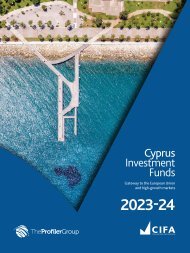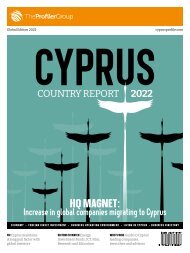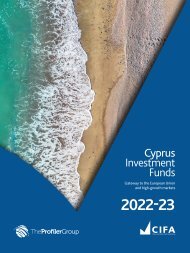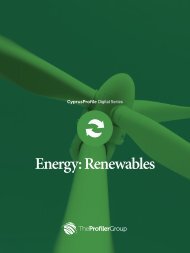2020 Cyprus Country Report
The 2020 Cyprus Country Report features in-depth articles on the economy, foreign direct investment, international trade and headquartering as well as detailed sector profiles and insights from Cyprus’ 100 most influential political, economic and business leaders shaping the future of their country and its industries.
The 2020 Cyprus Country Report features in-depth articles on the economy, foreign direct investment, international trade and headquartering as well as detailed sector profiles and insights from Cyprus’ 100 most influential political, economic and business leaders shaping the future of their country and its industries.
You also want an ePaper? Increase the reach of your titles
YUMPU automatically turns print PDFs into web optimized ePapers that Google loves.
The unprecedented<br />
coronavirus<br />
pandemic<br />
and the subsequent<br />
lockdowns<br />
around the world have<br />
sped up digitisation. The crisis<br />
will have implications for business<br />
globally for the next 12 to<br />
72 months mainly on service<br />
providing sectors such as aviation,<br />
cruise, and hospitalities.<br />
New and more productive<br />
ways of working will eventually<br />
evolve and the faster we adapt,<br />
the better the recovery. While<br />
automation was already a big<br />
part of DP World’s business<br />
model, digital technologies<br />
are a big part of the solution<br />
in maintaining a productive<br />
workflow within our ports.<br />
Nawaf Abdulla<br />
CEO<br />
DP World Limassol<br />
THE HYDROCARBONS EFFECT<br />
<strong>Cyprus</strong>’ transport and logistics sector has already<br />
seen big benefits from the discovery of natural<br />
gas in Cypriot, Israeli and Egyptian waters – even<br />
before all these resources have been extracted and<br />
monetised. <strong>Cyprus</strong>-based logistics companies<br />
have been able to capitalise on the island’s geographical<br />
advantages to offer specialised support<br />
to oil and gas companies such as ExxonMobil and<br />
ENI as they operate both in <strong>Cyprus</strong>’ own offshore<br />
gas fields and those of its regional neighbours.<br />
The operations of ENI in Egypt’s giant Zohr gas<br />
field for instance, have been underpinned by facilities<br />
provided by Limassol port. Gas pipelines<br />
destined for Zohr were stored at Limassol before<br />
being shipped to Egypt and the field’s pipelaying<br />
vessel was also mobilised from the port.<br />
As the search for offshore natural gas accelerates,<br />
Limassol port enjoys a strong competitive<br />
advantage as the logistics base for the increasing<br />
number of multinational oil and gas giants<br />
and service companies drawn to the island.<br />
International port operator DP World Limassol<br />
has already provided <strong>Cyprus</strong> with significant<br />
added muscle as the island strives to become the<br />
region’s pre-eminent energy services and trading<br />
hub. An onsite oil and gas logistics base has also<br />
been established at Limassol port. It is a multi-user<br />
area that includes a 430-metre dedicated berth<br />
to oil and gas activities, mobilisation/demobilisation<br />
operations, open bonded and covered storages<br />
and warehouses, offices and drilling liquid<br />
production facilities to support oil and gas operations<br />
and offshore explorations in the Eastern<br />
Mediterranean. In 2019, DP World Limassol acquired<br />
a range of state-of the-art vessel-loading<br />
equipment for the handling of general cargo and<br />
for use in its dedicated 430-metre oil and gas<br />
berth. Its new mobile harbour crane with heavylifting<br />
capabilities will speed up the process of<br />
loading and unloading, resulting in a significant<br />
reduction in vessel turnaround time. The new<br />
crane will help maximise the multipurpose port’s<br />
potential and will lead to a higher turnover at all<br />
its berths.<br />
KEY FUEL TERMINAL<br />
The island’s reputation as a leading logistics and<br />
support provider for the oil and gas industry in<br />
the East Med is complemented by its emerging<br />
role as a centre for the processing, storage and<br />
re-export of fuel. This is largely due to the development<br />
of a sophisticated €300-million fuel<br />
distillation terminal at Vassilikos. It is operated<br />
by VTTV, the <strong>Cyprus</strong> subsidiary of Dutch multinational<br />
VTTI, and processes so-called ‘white’<br />
or ‘clean’ products that have already been refined,<br />
such as diesel or middle distillates. These are<br />
shipped to Vassilikos from producers in the Gulf<br />
and the former soviet states and are then blended<br />
or modified to meet the specifications of the<br />
European market.<br />
VTTV is the first energy terminal of its kind<br />
in the Eastern Mediterranean which connects<br />
Europe and the Black Sea with markets in the<br />
Middle East and Asia. Product fuel oil from the<br />
Black Sea area heading to markets in Asia must<br />
first be transported in small ships because of<br />
shallow waters in the Bosporus. At Vassilikos,<br />
VTTV helps to ‘build bulk’ and processes the<br />
cargo to the correct specifications for it to be exported<br />
economically via much larger vessels to<br />
the more distant markets of Asia.<br />
The existing VTTV terminal consists of 28<br />
tanks and has a capacity of 544,000 cubic metres,<br />
a 1.5km long deep-water marine jetty and four<br />
berths, capable of accommodating vessels from<br />
5,000 to 160,000 DWT. These facilities mean that<br />
it is ideally placed to benefit from the growth<br />
in ship-to-ship cargo transfer operations in the<br />
region. Most transfers take place offshore, saving<br />
on port fees but this can be difficult and dangerous<br />
in bad weather and can lead to environmentally<br />
damaging oil spills. VTTV’s purpose-built<br />
jetty provides a safer, less environmentally hazardous<br />
alternative.<br />
In <strong>2020</strong>, the oldest <strong>Cyprus</strong> petroleum<br />
company Petrolina joined international energy<br />
trader VTTV in Vassilikos, inaugurating a new<br />
€80 million liquid fuels storage facility. The stock<br />
exchange-listed company has tripled its capacity,<br />
by installing 18 storage tanks holding 113,000<br />
cubic metres, up from the 36,000 at the old terminal<br />
in Larnaca. The Vassilikos area is being developed<br />
as <strong>Cyprus</strong>’ new energy centre and dedicated<br />
port, with multimillion-euro plans underway to<br />
also build a liquified natural gas (LNG) import<br />
terminal.<br />
ATTRACTIVE CRUISE PORT<br />
Before the pandemic, <strong>Cyprus</strong> was gaining momentum<br />
in reviving its status as an attractive<br />
port of call for cruise ships exploring the Eastern<br />
Mediterranean region. Evidence of this was<br />
British operator TUI announcing 13 new destinations<br />
leaving from Limassol Port for the winter<br />
season 2019-20, which was expected to boost<br />
tourism numbers. Although many of the cruises<br />
follow the familiar Mediterranean formula, more<br />
exotic routes were also launched such as a sail<br />
from Barbados to Limassol. To strengthen <strong>Cyprus</strong>’<br />
maritime tourism, a new passenger terminal was<br />
inaugurated in 2018 by port operator DP World<br />
Limassol, with plans to increase passenger traffic<br />
of the port by 35%. Even before the establishment<br />
Sector Profile<br />
<strong>Country</strong> <strong>Report</strong> CYPRUS <strong>2020</strong> 147

















